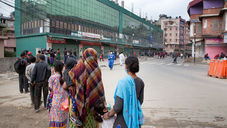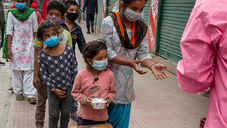A front-line solidarity
The health situation is getting worse and worse in Nepal. And the statistics are certainly underestimated considering the lack of testing capacities. Hospitals are overwhelmed, they miss ICU beds, oxygen, ventilators, medical supplies, but also vaccines. But although the context is dark, there's also an amazing solidarity coming out, notably in the capital.
Since the start of this new lockdown, individual people, associations, volunteers have been on the front-line supporting those most affected by the pandemic.
Here a young girl in front of a pharmacy, with 4 lists in her hand: “Each day I'm delivering medicines for neighbourhood people. Some of them have Covid symptoms but there're also old people who are afraid to go out”. Crossed in the street, a man carries a huge bag full of masks on his scooter “It's for an association, they do not have a pass to circulate during this lockdown, but I do... ”

n Lalitpur, in front of Mahalaxmisthan temple, two women are distributing fruits and juice boxes to homeless people. Ten minutes later, a van full of water bottles and packed food follows. “We started this action when the new lockdown came out, explains Kusum. Maybe half of these people live on the street, people experienced in homelessness. But also families which are actually daily workers. They work in hotels, in the construction sector, as housemaid, cleaning ladies, etc. but there's no work right now. So they're all hungry and they're out on the street looking for food.” Kusun is volunteer. With her husband and friends, she took this initiative last year, during the first lockdown. “I just could not stay still, I thought I should start doing something and we started by cooking food at home and bringing it here. It became rapidly a really big thing and we started getting support and donations from all around.” She also do family packs. “At the start of the lockdown we helped 50 people but we delivered 70 today and I know it will be more than hundred very soon...”

A few kilometres further, on the other side of Bagmati river close to the historical centre, another queue is waiting, keeping social distance. “We're feeding more than 300 people a day, and the number is increasing every day, says Nabraj working with the Spanish NGO Hugging Nepal. “We are collaborating with other NGOs and individual youths who are willing to help, like so many local friends.” Among them, Pooja. “We give food packs, water and masks. But when we encourage them to wear a mask, most of them tell us they are mostly scared of hunger, not of the virus !”

During the last lockdown there were many volunteers helping but now, with this new variant, people are scared. “Even my friends are telling me « how can you take such risks ? you'd better stay home, and certainly with all these overloaded hospitals »

To avoid any risks, there is also online solidarity, as these doctors and other health personnel offer now free online consultations for self-isolated people suffering from Covid-19.
Another very interesting initiative is Covid Connect Nepal, a new volunteer-run platform initiated to connect assistance providers and seekers, and publish credible data and information about the Covid-19 status quo in Nepal.


Sagun is one of its creators and volunteers. “A few weeks ago, me and some of my friends were chatting on the New Delhi's situation and being a neighboring country with an open border we knew that was a serious concern for us. We of course knew this second wave will be in Nepal soon. And we were aware of the situation in the hospitals, the huge demands of health facilities, etc. So we decided there's a need of a free platform where people who might have difficulties in finding the resources. So three days before this lockdown we planned out all the system we needed. We first started on Twitter, Instagram and Facebook. The website was fully functional the day the lockdown started.”
Sagun and all the technical team are all volunteers. “Now we have about 150 volunteers. A lot of medical ones helping us, we have students who want to involve in term of support and data collection, etc. Any kind of requests that come to Connect Nepal, whether through phone calls or social medias, we try to redirect it to our website. Then our support team will call the person to fill the form, verify all the information and try to find the resource whether it's available : hospitals, oxygen suppliers, medicine suppliers, ambulance services, etc.”
Sagun knows it will be impossible for them to go on like this during weeks or months. “We have just set up a platform where people who need something can ask someone for help. But normally it's not our job to do this...”























